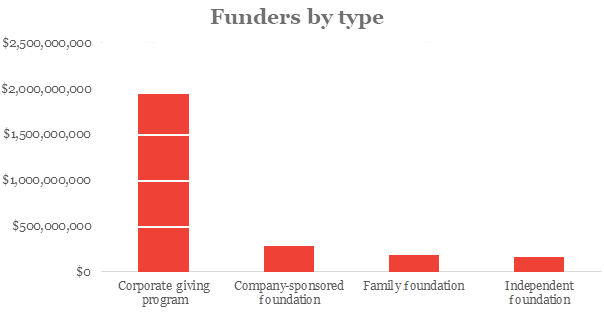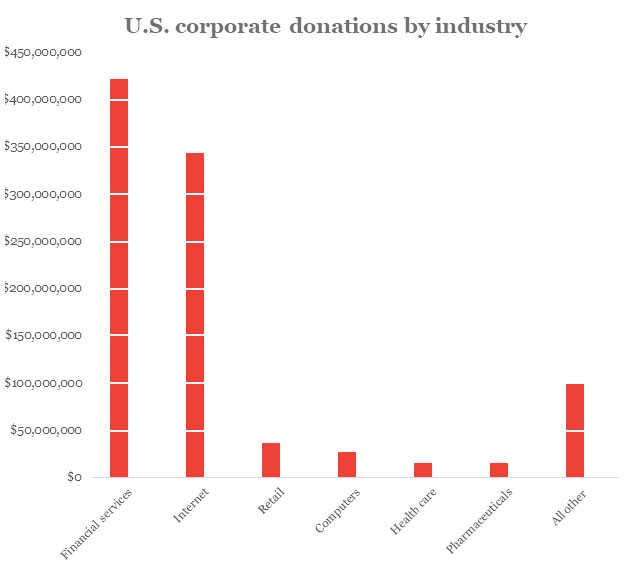Global philanthropic response to COVID-19 approaches $3 billion

On March 3, Candid identified almost $1 billion in worldwide pledges and donations for frontline relief of a growing coronavirus (COVID-19) epidemic. In the two and a half weeks since then, the World Health Organization (WHO) has declared COVID-19 a pandemic, which has so far infected 523,163 people worldwide and resulted in the deaths of more than 23,639 as of yesterday afternoon (Eastern time). As the epidemic became a pandemic, the global philanthropic response increased exponentially to meet the challenge. By March 23, the philanthropic response to COVID-19 had almost tripled to $2.6 billion.
As occurred during the first two months of the crisis, overall giving this month remains true to historical patterns of disaster giving in every way but total dollar amount. (Giving in response to the coronavirus is much higher.) What has changed in the last couple of weeks is the origin of funding by country, which mirrors the migration of the disease.
| Country | Grants | Amount | ||
|---|---|---|---|---|
| United States | 266 | $1,248,226,540 | ||
| China | 81 | $894,476,081 | ||
| Italy | 13 | $273,247,240 | ||
| United Kingdom | 6 | $61,721,542 | ||
| South Korea | 9 | $46,627,565 | ||
| Hong Kong | 12 | $32,406,184 | ||
| Switzerland | 1 | $20,000,000 | ||
| Macao | 3 | $6,240,000 | ||
| Japan | 9 | $5,912,200 | ||
| France | 4 | $5,717,530 | ||
| Germany | 3 | $1,892,100 | ||
| Australia | 2 | $1,586,200 | ||
| New Zealand | 2 | $1,339,842 | ||
| Nigeria | 1 | $547,196 | ||
| Austria | 1 | $432,600 | ||
| Singapore | 2 | $357,500 |
Together, the United States and China (including Hong Kong and Macao, China’s Special Administrative Regions) still account for 87 percent of pledges and 83 percent of total dollar amount, but the U.S. total increased almost 700 percent and now accounts for more than two-thirds of pledges and almost half of total dollar value worldwide. Italy, whose philanthropic response was almost non-existent two weeks ago, now accounts for 11 percent of total dollar value of announced grants.
Grantmakers and their relative contributions have also changed. Where early on the Gates Foundation’s $100 million commitment accounted for 55 percent of the U.S. contribution, it is now 9 percent of the more than $1.2 billion pledged. The largest single donation is now the more than $175 million announced by the Wells Fargo Foundation “to help address food, shelter, small business and housing stability, as well as to provide help to public health organizations.” Including other announced contributions, the Wells Fargo Foundation’s total announced contribution of more than $181.2 million now constitutes 15 percent of the U.S. amount. And where there were only 2 U.S. grantmakers in the top 20 at the end of February, there are now 6 in the top 12 with a week to go in March.
| Funder | Grants | Amount | ||
|---|---|---|---|---|
| Wells Fargo Foundation | 4 | $181,250,000 | ||
| Tencent Holdings | 2 | $173,040,000 | ||
| Alibaba Group | 1 | $144,200,000 | ||
| 7 | $122,025,000 | |||
| China Evergrande Group | 1 | $115,000,000 | ||
| Assicurazioni Generali S.p.A. | 1 | $110,093,500 | ||
| Intesa Sanpaolo S.p.A. | 1 | $110,093,500 | ||
| Bill & Melinda Gates Foundation | 6 | $110,000,000 | ||
| Bank of America Corporation | 5 | $101,500,000 | ||
| Netflix | 1 | $100,000,000 | ||
| 6 | $81,750,000 |
As overall contributions have grown, so have relative contributions by type of funder. Direct corporate giving still accounts for the lion’s share of contributions, but the percentages are down as the dollar value of contributions from corporate, family, and community foundations have increased. The dollar value of contributions from corporate foundations has increased more than fivefold.

Companies, both directly and through their foundations, constitute 77 percent of the total U.S. philanthropic response to COVID-19. As Candid president Bradford Smith told the Chronicle of Philanthropy, after 11 years of a bull market, many businesses have cash reserves. Broken down by industry, corporate giving is following traditional patterns. Historically, companies in the financial services sector have been the most generous in response to disasters, and it is no different here. Banks, investment firms, and lenders have contributed far and away the most to COVID-19 relief, announcing commitments totaling $421 million, trailed by Internet (i.e., Amazon, Facebook, Google, Netflix) companies at $343 million. Together the two sectors account for 80 percent of the total dollar value of U.S. contributions. The graph below shows the industries that account for 90 percent of U.S. corporate contributions.

Some stray observations:
- Some 65 percent of the dollar value of pledges announced in January and February came in the two weeks after January 23. In February, pledges actually declined by more than 12 percent, as countries, in various stages of delay and denial, looked on helplessly while the virus began its relentless spread beyond China’s borders. In the first three weeks of March, more than $1.5 billion has been committed, accounting for 61 percent of the total since January 23.
- Unknown and multiple recipients continue to account for most of the pledges and dollar value for the COVID-19 response, followed by the various Chinese Red Cross organizations. For named recipients, we’re seeing a relatively small but growing number of grants to such organizations as Feeding America, Direct Relief, and the CDC Foundation.
- The largest donation by an individual was made by Silvio Berlusconi, the billionaire and former Italian prime minister, who donated 10 million euros ($10.7 million) for a new hospital being built on the former fairgrounds in Milan. President Trump donated his 2019 Q4 salary of $100,000 to the Department of Health and Human Services.
- In addition to the efforts of organized philanthropy, individuals and communities are coming together to help their families, friends, and neighbors. GoFundMe tweeted that more than 22,000 COVID-19 fundraisers have been initiated in the last few weeks by the global GoFundMe community. Collectively, they’ve raised more than $40 million.
In my first blog post, I speculated on whether private philanthropy would largely step aside—as it did during the 2014 Ebola epidemic—in favor of the large-scale measures that only national governments can undertake to address regional and global public health crises. I thought that it would likely depend on how governments performed in their fundamental obligations to guarantee public safety and well-being.
Now that several governments have concluded that maintaining public safety requires the shuttering of businesses and the prohibition of social interaction, we are left with much more than a public health emergency. We are left, instead, with a cascading economic catastrophe that touches everybody in the national community to one degree or another.
In the face of government hesitation, private philanthropy, especially community foundations, are creating COVID-19 response funds to help the most vulnerable members of their communities weather the storm. Philanthropy will not replace government action, but it will quickly and compassionately offer a helping hand to those who need it when they need it.
Editor’s note: for more information on philanthropy’s response to the pandemic, visit Candid’s coronavirus pop-up webpage.







Camellia Rahbary Philanthropy says:
This blog is so help full, thank you for this information
Camellia Rahbary Philanthropy says:
This Blog Is Helpful.
suzanne says:
Hi, Max,
We list RFPs (requests for proposals) at the top of https://candid.org/explore-issues/coronavirus/ and have a list of funds that are helping nonprofits during the crisis at https://candid.org/explore-issues/coronavirus/funds. You can also find a list at http://bit.ly/NP-COVID-19.
Regards,
Suzanne Coffman
Editorial Director, Candid
Max Pierre says:
Lee County Refugee center located in Fort-Myers is a humanitarian agency that serves homeless, out of jail individuals having not an immediate place to sleep, low-income, Refugees, and Immigrants. We are a tax exempt non-profit 501 ( c ) ( 3 ) organization. How can you have us some financial sponsorship to buy more food, clothes, gloves, masks, Hand Sanitiser, Soap, funds to help our clientele. One person can get a whole community infected. we must help everyone. Hope you reply.